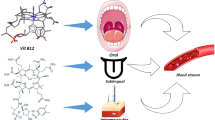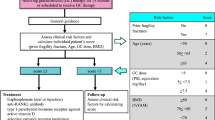Abstract
Purpose
Epidemiologic and preclinical data suggest a potential role for vitamin D in breast cancer treatment and prevention. However, results of prospective randomized trials are inconsistent. The objective of this study was to assess the effects of high-dose cholecalciferol (vitamin D3) on breast tumour proliferation and apoptosis.
Methods
We conducted a prospective, randomized, phase 2, double-blinded pre-surgical window of opportunity trial. Newly diagnosed breast cancer patients were randomized to receive 40,000 IU of vitamin D3 per day or placebo for 2 to 6 weeks prior to breast surgery. The primary outcome was the relative change in proliferation (Ki67) and apoptosis (cleaved caspase 3 apoptotic assay [CC3]) in primary breast cancer cells pre and post treatment.
Results
Of 83 patients randomized, 80 completed the study (43 (53.8%) vitamin D and 37 (46.3%) placebo). Mean duration of drug intake was 19 days (range 9–28 days). There were no significant differences between the control arm and the vitamin D arm in percent changes of either Ki67 index (1.6% vs. 16.7%, p = 0.25) or CC3 (− 55.9% vs. − 45.9%, p = 0.28). Serum 25-hydroxyvitamin D (25-OHD) levels were 3 times higher in the vitamin D arm (62 nmol/L vs. 246 nmol/L, p < 0.001). Adverse effects were minimal and all classified as grade 1.
Conclusions
Despite significantly higher levels of serum 25-OHD in the vitamin D-treated group, this was not associated with any significant effects on tumour proliferation or apoptosis. These findings are consistent with the lack of benefit observed in prospective prevention trials.
Trial registry
Trial registration clinicaltrials.gov NCT01948128.


Similar content being viewed by others
References
Feldman D, Krishnan AV, Swami S et al (2014) The role of vitamin D in reducing cancer risk and progression. Nat Rev Cancer 14:342–357. https://doi.org/10.1038/nrc3691
Duffy MJ, Murray A, Synnott NC et al (2017) Vitamin D analogues: potential use in cancer treatment. Crit Rev Oncol Hematol 112:190–197. https://doi.org/10.1016/j.critrevonc.2017.02.015
Jacobs ET, Kohler LN, Kunihiro AG, Jurutka PW (2016) Vitamin D and colorectal, breast, and prostate cancers: a review of the epidemiological evidence. J Cancer 7:232–240. https://doi.org/10.7150/jca.13403
Albanes D (2015) Vitamin D and cancer: diversity, complexity, and still a ways to go. Cancer Prev Res (Phila) 8:657–661. https://doi.org/10.1158/1940-6207.CAPR-15-0207
Zhang X, Harbeck N, Jeschke U, Doisneau-Sixou S (2017) Influence of vitamin D signaling on hormone receptor status and HER2 expression in breast cancer. J Cancer Res Clin Oncol 143:1107–1122. https://doi.org/10.1007/s00432-016-2325-y
Narvaez CJ, Matthews D, LaPorta E et al (2014) The impact of vitamin D in breast cancer: genomics, pathways, metabolism. Front Physiol 5:213. https://doi.org/10.3389/fphys.2014.00213
Mehta RG, Peng X, Alimirah F et al (2013) Vitamin D and breast cancer: emerging concepts. Cancer Lett 334:95–100. https://doi.org/10.1016/j.canlet.2012.10.034
Welsh J (2018) Vitamin D and breast cancer: past and present. J Steroid Biochem Mol Biol 177:15–20. https://doi.org/10.1016/j.jsbmb.2017.07.025
Bandera Merchan B, Morcillo S, Martin-Nuñez G et al (2017) The role of vitamin D and VDR in carcinogenesis: through epidemiology and basic sciences. J Steroid Biochem Mol Biol 167:203–218. https://doi.org/10.1016/j.jsbmb.2016.11.020
Shao T, Klein P, Grossbard ML (2012) Vitamin D and breast cancer. Oncologist 17:36–45. https://doi.org/10.1634/theoncologist.2011-0278
Scragg R, Khaw K-T, Toop L et al (2018) Monthly high-dose vitamin D supplementation and cancer risk. JAMA Oncol 4:e182178. https://doi.org/10.1001/jamaoncol.2018.2178
Manson JE, Cook NR, Lee I-M et al (2019) Vitamin D supplements and prevention of cancer and cardiovascular disease. N Engl J Med 380:33–44. https://doi.org/10.1056/NEJMoa1809944
Zeichner SB, Koru-Sengul T, Shah N et al (2015) Improved clinical outcomes associated with vitamin D supplementation during adjuvant chemotherapy in patients with HER2+ nonmetastatic breast cancer. Clin Breast Cancer 15:e1–e11. https://doi.org/10.1016/j.clbc.2014.08.001
Amir E, Simmons CE, Freedman OC et al (2010) A phase 2 trial exploring the effects of high-dose (10,000 IU/day) vitamin D3 in breast cancer patients with bone metastases. Cancer 116:284–291. https://doi.org/10.1002/cncr.24749
Levasseur N, Clemons M, Hilton J et al (2015) Neoadjuvant endocrine therapy and window of opportunity trials: new standards in the treatment of breast cancer? Minerva Chir 70:181–193
Arnaout A, Robertson S, Kuchuk I et al (2015) Evaluating the feasibility of performing window of opportunity trials in breast cancer. Int J Surg Oncol 2015:785793. https://doi.org/10.1155/2015/785793
Wagner D, Trudel D, Van der Kwast T et al (2013) Randomized clinical trial of vitamin D3 doses on prostatic vitamin D metabolite levels and Ki67 labeling in prostate cancer patients. J Clin Endocrinol Metab 98:1498–1507. https://doi.org/10.1210/jc.2012-4019
Garland CF, French CB, Baggerly LL, Heaney RP (2011) Vitamin D supplement doses and serum 25-hydroxyvitamin D in the range associated with cancer prevention. Anticancer Res 31:607–611
Yerushalmi R, Woods R, Ravdin PM et al (2010) Ki67 in breast cancer: prognostic and predictive potential. Lancet Oncol 11:174–183. https://doi.org/10.1016/S1470-2045(09)70262-1
Pu X, Storr SJ, Zhang Y et al (2017) Caspase-3 and caspase-8 expression in breast cancer: caspase-3 is associated with survival. Apoptosis 22:357–368. https://doi.org/10.1007/s10495-016-1323-5
National Cancer Institute (2009) Common Terminology Criteria for Adverse Events (CTCAE) Version 4.0
Dowsett M, Smith IE, Ebbs SR et al (2005) Short-term changes in Ki-67 during neoadjuvant treatment of primary breast cancer with anastrozole or tamoxifen alone or combined correlate with recurrence-free survival. Clin Cancer Res 11:951s–958s
Vrieling A, Hein R, Abbas S et al (2011) Serum 25-hydroxyvitamin D and postmenopausal breast cancer survival: a prospective patient cohort study. Breast Cancer Res 13:R74. https://doi.org/10.1186/bcr2920
Swami S, Krishnan AV, Wang JY et al (2012) Dietary vitamin D3 and 1,25-dihydroxyvitamin D3 (calcitriol) exhibit equivalent anticancer activity in mouse xenograft models of breast and prostate cancer. Endocrinology 153:2576–2587. https://doi.org/10.1210/en.2011-1600
Glimelius B, Lahn M (2011) Window-of-opportunity trials to evaluate clinical activity of new molecular entities in oncology. Ann Oncol 22:1717–1725. https://doi.org/10.1093/annonc/mdq622
Kalinsky K, Hershman DL (2012) Cracking open window of opportunity trials. J Clin Oncol 30:2573–2575. https://doi.org/10.1200/JCO.2012.42.3293
Urata YN, de Lyra EC, Katayama MLH et al (2014) Calcitriol supplementation effects on Ki67 expression and transcriptional profile of breast cancer specimens from post-menopausal patients. Clin Nutr 33:136–142. https://doi.org/10.1016/j.clnu.2013.04.001
Institute of Medicine (2011) Dietary reference intakes for calcium and vitamin D. National Academies Press, Washington, DC
Vieth R, Cole D, Hawker G et al (2001) Wintertime vitamin D insufficiency is common in young Canadian women and their vitamin D intake does not prevent it. Eur J Clin Nutr 55:1091–1097. https://doi.org/10.1038/sj.ejcn.1601275
Holick MF (2007) Vitamin D deficiency. N Engl J Med 357:266–281. https://doi.org/10.1056/NEJMra070553
Hadji P, Coleman RE, Wilson C et al (2016) Adjuvant bisphosphonates in early breast cancer: consensus guidance for clinical practice from a European Panel. Ann Oncol 27:379–390. https://doi.org/10.1093/annonc/mdv617
Simmons C, Amir E, Dranitsaris G et al (2009) Altered calcium metabolism in patients on long-term bisphosphonate therapy for metastatic breast cancer. Anticancer Res 29:2707–2711
Martínez-Alonso M, Dusso A, Ariza G, Nabal M (2016) Vitamin D deficiency and its association with fatigue and quality of life in advanced cancer patients under palliative care: a cross-sectional study. Palliat Med 30:89–96. https://doi.org/10.1177/0269216315601954
True LD (2008) Quality control in molecular immunohistochemistry. Histochem Cell Biol 130:473–480. https://doi.org/10.1007/s00418-008-0481-0
Polley M-YC, Leung SCY, McShane LM et al (2013) An International Ki67 Reproducibility study. JNCI J Natl Cancer Inst 105:1897–1906. https://doi.org/10.1093/jnci/djt306
Schmitz S, Duhoux F, Machiels J-P (2016) Window of opportunity studies: do they fulfil our expectations? Cancer Treat Rev 43:50–57. https://doi.org/10.1016/j.ctrv.2015.12.005
Sherman MH, Yu RT, Engle DD et al (2014) Vitamin D receptor-mediated stromal reprogramming suppresses pancreatitis and enhances pancreatic cancer therapy. Cell 159:80–93. https://doi.org/10.1016/j.cell.2014.08.007
Ma Y, Trump DL, Johnson CS (2010) Vitamin D in combination cancer treatment. J Cancer 1:101–107
Beer TM, Lemmon D, Lowe BA, Henner WD (2003) High-dose weekly oral calcitriol in patients with a rising PSA after prostatectomy or radiation for prostate carcinoma. Cancer 97:1217–1224. https://doi.org/10.1002/cncr.11179
Acknowledgements
The primary investigator developed the protocol during 14th Annual Joint ECCO-AACR-EORTC-ESMO Flims “Methods in Clinical Cancer Research” Workshop 2012. The authors are grateful to the research staff for their assistance in recruiting participants and for data collection.
Funding
This work was supported by the Canadian Breast Cancer Foundation and University of Ottawa Department of Surgery research grant.
Author information
Authors and Affiliations
Corresponding author
Ethics declarations
Conflict of interest
Dr Vieth is an unpaid advisor to the Vitamin D Society, and receives royalties from partial ownership and a patent pertaining to vitamin D supplementation.
Ethical approval
All procedures performed in studies involving human participants were in accordance with the ethical standards of the institutional and/or national research committee (Ottawa Hospital Research Ethics Board) and with the 1964 Helsinki declaration and its later amendments or comparable ethical standards.
Informed consent
Informed consent was obtained from all individual participants included in the study.
Additional information
Publisher's Note
Springer Nature remains neutral with regard to jurisdictional claims in published maps and institutional affiliations.
Rights and permissions
About this article
Cite this article
Arnaout, A., Robertson, S., Pond, G.R. et al. Randomized window of opportunity trial evaluating high-dose vitamin D in breast cancer patients. Breast Cancer Res Treat 178, 347–356 (2019). https://doi.org/10.1007/s10549-019-05392-9
Received:
Accepted:
Published:
Issue Date:
DOI: https://doi.org/10.1007/s10549-019-05392-9




